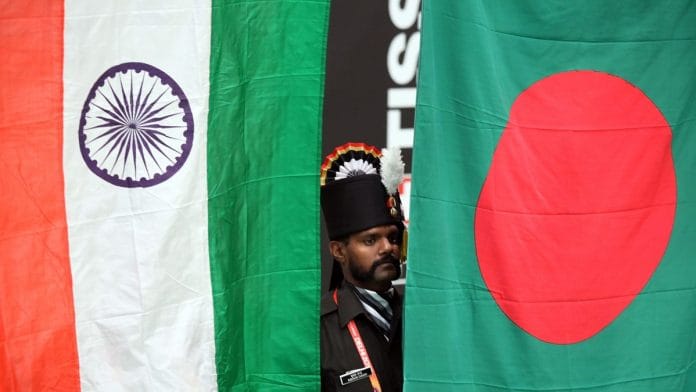Thank you dear subscribers, we are overwhelmed with your response.
Your Turn is a unique section from ThePrint featuring points of view from its subscribers. If you are a subscriber, have a point of view, please send it to us. If not, do subscribe here: https://theprint.in/subscribe/
The events in Bangladesh have not yet been reconciled by Delhi, and it seems the approach is to wait and watch and not to engage at the highest levels, though it is tempting given what is at stake. The Yunus-led interim government, still finding its feet, would want every kind of support, especially from India. However, it is evident that India is yet to get off its blocks and publicly signal an extension of its hand. Delhi is still grappling with Sheikh Hasina, who is searching for a safe asylum while in India, and it will be difficult for her if India goes ahead shaking hands with the Jamaat-backed Yunus-led government. Hasina knows India won’t give up on her yet or her party, but at the present, she only has the option of keeping quiet as her extradition request is quietly rising for apparent crimes under her rule. This is where there seems no passage for both Modi and Yunus to engage, as both stick to their own posturing for their own political reasons. The continuing attacks on Hindus in Bangladesh and Yunus’s recent statement, which suggests India dial down its created narrative, have not gone well, and being the largest neighbour and due to its own muscular diplomacy, Delhi has tied its hands already, hence the outward posturing. On the other hand, the Yunus-led government is banking on the legitimacy provided by the western governments, especially the U.S, which have repeatedly stated that it was a movement by students against authoritarianism under Sheikh Hasina. This legitimacy, though difficult for India to approve of, is giving the Yunus-led interim government more teeth against a reticent Delhi. The recent readouts of the telephonic conversations between Modi and Biden show the varying perspectives accorded by the two. And given America’s history in the region and their selective support for radical groups, India’s concerns are increasingly voiced out through mainstream media and op-eds.
The battle for narratives is going nowhere for India, who are up against a century-old, well-oiled narrative churning machine. The dependence on Western aid, its strong media and intelligence network, and its business and investment ties mean India has to significantly put in the efforts to control the narrative, bring their western allies to the table, and arrive at a consensus. The Indian media’s absence on the streets was a glaring example of its absence in the neighbourhood.
India already has an example to its north-east in Myanmar, where it has failed to redirect the country and its people towards restoration of peace and normalcy, and its allies to the east, including Japan, have toed America’s line, sanctioning and isolating Myanmar, making less room for India to set the rules for engagement. The stalemate in Myanmar has resulted in India being unable to support or make deep inroads on either side of the parties involved, resulting in being a mere spectator. The projects and investments by India and Japan lie in a limbo. In the case of Bangladesh, it is in India’s interests to encourage elections soon and help the Awami League, who are leaderless at the moment. With the release of leaders of banned terrorist groups and the increasing influence of Jamaat in the current regime, the future of Bangladesh as a well-functioning democracy remains to be seen. Make no mistake, Bangladesh’s politicians are rewriting their political history, and India’s prolonged silence and reticence can quickly make it an outsider in the political echelons of its young neighbour. The U.S nor the Chinese, who recently endorsed the leadership of the Jamaat, care much about democracy in Bangladesh. Their priorities end in getting a friendly regime, elected or not, and that is where Delhi’s problems begin. India should worry about Bangladesh’s future as a secular, progressive state, as it depends on it being democratic. Given the polarised character of the politics and the people, any radical autocratic regime threatens peace in the region. India’s strategic investments, economic integration, and security efforts need political and people-to-people support. India will have to see that the Awami League survives as a party, its legacy restored, and will have to restore a fair democracy in Bangladesh, which it ironically hesitated to support some months back. India’s own democratic history and its support for fellow democracies in the region over the decades have strongly ingrained democracy and people’s rights in the region. There is no way India can get away for long, supporting an unelected, unpopular government, though they may be friendly. For now, security forces have their work cutout with differences persisting in the priorities between the two governments, and they will hope that the existing arrangements between them stand uncollapsed in this polarised political atmosphere.
These pieces are being published as they have been received – they have not been edited/fact-checked by ThePrint


